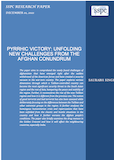Moral Policing, Public Floggings, and the Decline of Girls' Education in Taliban ruled Afghanistan
Since the Taliban's return to power in August 2021, Afghanistan has faced a sharp decline in human rights, with women and minorities bearing the brunt of repression. The Taliban’s enforcement of moral policing, public floggings, and the systematic dismantling of girls' education reflects their rigid interpretation of Sharia law despite global condemnation. This article examines the impact of these policies on Afghan society, particularly women and girls while highlighting the Taliban’s justification through religious edicts.





